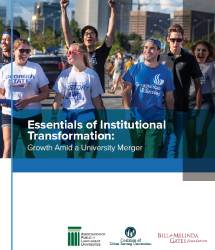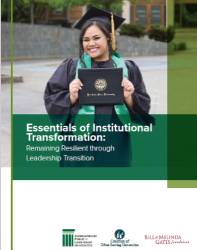- The Frontier Set is a select group of high-performing, high-potential colleges, universities, state systems and partnering organizations committed to eliminating race, ethnicity, and income as predictors of student success by transforming how institutions operate.
- The Frontier Set aims to understand how to successfully advance transformational change amid senior leadership transitions, institutional mergers, and performance-based state funding models.
- APLU and USU developed an open-access course module based on the content of the case studies and its institutional transformation experiences
Advancing Equity and University Transformation During Major Changes
 Public urban research universities continue to face a host of challenging inflection points, from senior leadership transitions to mergers to shifts to performance-based state funding, to name just a few. How institutions can continue to advance institutional transformation during these pivotal moments is critical to their long-term success in achieving equity and increasing student success.
Public urban research universities continue to face a host of challenging inflection points, from senior leadership transitions to mergers to shifts to performance-based state funding, to name just a few. How institutions can continue to advance institutional transformation during these pivotal moments is critical to their long-term success in achieving equity and increasing student success.
To help institutions successfully navigate these challenges and ultimately thrive, APLU and the Coalition of Urban Serving Universities (USU) worked with Florida International University, Georgia State University, and Portland State University as part of the Frontier Set initiative funded by the Bill & Melinda Gates Foundation to understand how to successfully advance transformational change amid senior leadership transitions, institutional mergers, and performance-based state funding models. APLU and USU are releasing in-depth case studies as roadmaps with insights to help other institutions address these shifts.
Essentials of Institutional Transformation: Case Studies
About the Frontier Set & the Journey of University Transformation
The Frontier Set is a select group of high-performing, high-potential colleges, universities, state systems and partnering organizations committed to eliminating race, ethnicity, and income as predictors of student success by transforming how institutions operate. Through strategic and tactical efforts, the Frontier Set participating universities and partnering organizations explored the why and how of institutional transformation. The three APLU and USU universities present separate, unique case studies to understand transformational change frameworks through different institutional contexts.
Collectively, the content of the three university case studies highlight the integral role of leveraging current practices while developing and expanding on new methods to meet the needs of students, staff, and faculty. The university case studies contribute knowledge on institutional transformation to the field with a specific focus on:
- highlighting how tailored support on advising, digital learning, faculty engagement, course redesign and other critical elements can enable post-secondary institutions to systematize and scale student success efforts; and
- building a knowledge base on transformational change across different institutional context as the case study topics apply to all institutions.
APLU USU Principles of Institutional Transformation Online Course Module
In addition to the three case studies, APLU and USU developed an open-access course module based on the content of the case studies and its institutional transformation experiences. The modules are grounded in change management, student experience, and the utilization of strategic foresight. This additional knowledge dissemination method will contribute to the institutional commitment to increasing student success and addressing opportunity and attainment equity gaps via a culture of innovation and transformation that is of value for the field.
Additional Resources
- Op-Ed: The 30,000-Foot View: Leading The Charge
By Andréa Rodriguez, Director, USU And APLU Office Of Urban Initiatives - Op-Ed: Moving from Site Lead to an Intermediary Role
By Mitzy Gonzalez, Program Manager, USU And APLU Office Of Urban Initiatives - Report: Using Reflection to Advance Equity-Focused Transformation
Observations From the Frontier Set You Can Use to Advance Equity



 Georgia State University Case Study
Georgia State University Case Study Portland State University Case Study
Portland State University Case Study Florida International University Case Study
Florida International University Case Study
Stay Connected
X (formerly Twitter)
Facebook
YouTube
LinkedIn
RSS